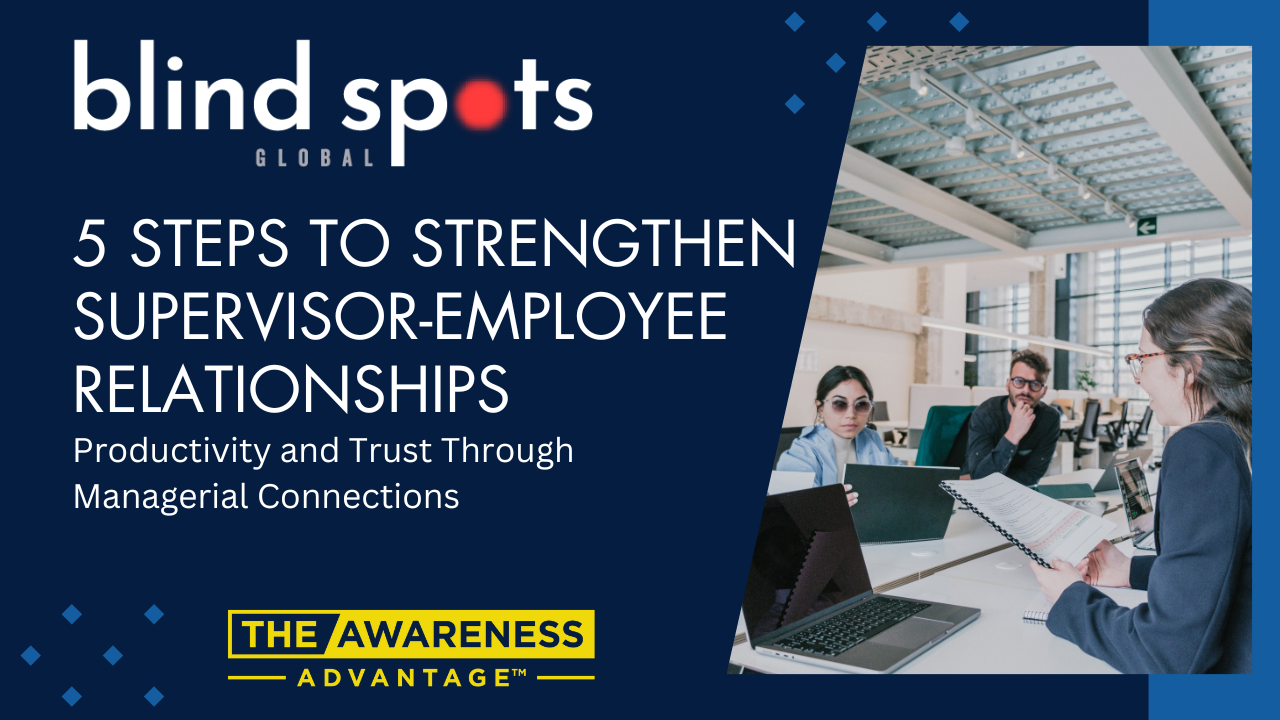
5 Steps to Strengthen Supervisor-Employee Relationships for Employee Retention
“The best workplace is the one that cares for its employees, then positions employee engagement as the catalyst for improving important business outcomes.” (Gallup.com)
Employee retention is a critical concern for organizations striving for long-term success and stability. Surprisingly, one of the primary reasons employees leave their jobs is poor relationships with their immediate supervisors. The quality of the supervisor-employee relationship directly impacts engagement, job satisfaction, and overall well-being of the workforce. Leaders can take proactive steps to strengthen these relationships, fostering a positive work environment that promotes loyalty and retention.
STEP 1: Understand the Impact of Supervisor-Employee Relationships
The relationship between supervisors and employees forms the foundation of a cohesive and productive workforce. Self-awareness in the moment, and empathy in leaders enable them to recognize the significant impact their actions and communication styles have on employee engagement. A lack of understanding, communication breakdowns, and a lack of support from supervisors can erode trust and lead to disengagement, prompting talented employees to seek better opportunities elsewhere.
STEP 2: Build Trust through Open Communication
Effective communication is at the heart of any successful supervisor-employee relationship. Leaders who embrace open and honest communication with their team members, make it a priority to have regular check-ins, one-on-one meetings, and constructive feedback sessions to help foster trust and transparency. When your employees feel their concerns are heard and valued, they are more likely to feel supported and motivated to stay with the organization.
STEP 3: Empower Employees with Autonomy
Supervisors who micromanage their teams risk creating an atmosphere of suffocation and decreased job satisfaction. Leaders must recognize the importance of providing employees with autonomy in their roles. Allowing your employees to take ownership of their work and make decisions fosters a sense of empowerment and increases job satisfaction. When your employees feel trusted and valued for their expertise, they are more inclined to remain committed to the organization.
STEP 4: Cultivate Emotional Intelligence
Emotional intelligence is a key component of successful supervisor-employee relationships. Leaders who are attuned to their own emotions and those of their employees show empathy and understanding, leaders can forge deeper connections with their teams. Emotional intelligence allows supervisors to navigate difficult conversations with sensitivity and resolve conflicts in a constructive manner, contributing to better relationships and employee retention.
STEP 5: Provide Opportunities for Growth and Development
Employees seek growth and development opportunities within their roles. Leaders who recognize the value of investing in employee development provide access to training, mentorship, and skill enhancement opportunities not only to boost employee engagement but to also strengthen the supervisor-employee relationship. When supervisors actively support their team members' career aspirations, employees are more likely to view their jobs as steppingstones to growth, leading to increased retention.
STEP 6: Recognize and Celebrate Achievements
Acknowledging employee accomplishments is a powerful driver of engagement and job satisfaction. Recognizing and celebrating your employees' efforts and contributions with simple gestures of appreciation, such as public recognition or personalized notes of gratitude, can go a long way in strengthening the supervisor-employee relationship and fostering loyalty on your team.
The strength of supervisor-employee relationships directly impacts employee retention, job satisfaction, and organizational success. Leaders who awareness can create a supportive and nurturing work environment that promotes loyalty and engagement. By prioritizing open communication, providing autonomy, cultivating emotional intelligence, and investing in employee growth, leaders like you can build strong bonds with their teams and inspire a sense of belonging.
Recognizing and celebrating employees' achievements reinforces a positive work culture, where team members feel valued and appreciated. Ultimately, if your organization fosters positive supervisor-employee relationships, you will experience higher employee retention rates, increased productivity, and a workforce that is committed to achieving shared goals. By embracing The Awareness Advantage leaders can lay the foundation for a thriving and successful organization built on trust, empathy, and lasting relationships.
Stay connected with news and updates!
Join our mailing list to receive the latest news and updates from our team.
Don't worry, your information will not be shared.
We hate SPAM. We will never sell your information, for any reason.

